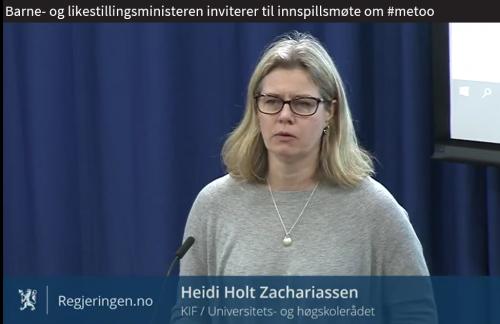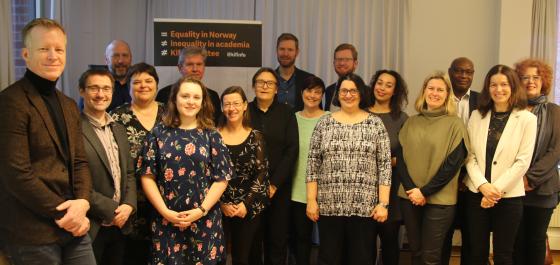The KIF Committee: Eight recommendations for lasting change after #MeToo
Minister of Children and Equality Linda Hofstad Helleland recently held an input meeting on the #MeToo movement. The KIF Committee has eight recommendations for the minister about the work to prevent sexual harassment.
Heidi Holt Zachariassen represented the Committee for Gender Balance and Diversity in Research (the KIF Committee) at the meeting, which focused on the #MeToo movement and the efforts to combat sexual harassment. The recommendations she presented have now been sent in written form to the Ministry of Children and Equality.
Before Christmas, the KIF Committee released a statement on sexual harassment and other forms of harassment. The committee called on the boards of the Association of Norwegian Research Institutes and the Norwegian Association of Higher Education Institutions to, among other things, develop a set of survey questions to map sexual harassment in the sector and to design an online leadership development course.
Read more about the statement: Harassment in the higher education sector – time for action (in Norwegian only)
How to create lasting change in the wake of #MeToo

These are the KIF Committee’s recommendations:
- Universities, university colleges and research institutes in Norway must have action plans and measures that promote gender balance and diversity, which in themselves create lasting change. We must have a long-term perspective on creating cultural change, but push for progress at the same time.
- We must understand that harassment has multiple causes and appears in many forms: e.g. a power imbalance or discriminatory attitudes about women and ethnic minorities or about different sexual orientations and disabilities.
- All the institutions must have guidelines and procedures for dealing with harassment cases. This was laid down in the Working Environment Act on 1 July 2017. If the institutions do not meet this requirement, they will face cutbacks in their funding from the ministry.
- More research is needed to identify the most effective measures for preventing harassment and changing the culture in environments where harassment occurs.
- The KIF Committee is demanding that questions about sexual harassment are included in the Working Environment and Climate Survey that is currently used in the sector. Until now, this has not been possible.
- Allocation letters from the Ministry of Education and Research should clearly require all institutions to have action plans and measures that promote gender balance and diversity, as well as to conduct awareness-raising efforts and establish procedures to prevent harassment and bullying.
Managers in the research sectors have a special responsibility:
- Managers must be required to have a clearly stated zero-tolerance policy against harassment and abuse. In addition:
- All managers in the sector should be able to document that they have had regular training in the kinds of behaviour that constitute harassment and discrimination, ways of dealing with the problem as a manager and the procedures established by their own institutions in this area.
Translated by Connie Stultz.
The Norwegian Association of Higher Education Institutions has formed a working group to combat sexual harassment in academia. Frank Reichert, Rector of the University of Agder, will chair the group.
Read more in Khrono (in Norwegian only).
The Minister of Children and Equality held an input meeting on 31 January 2018.
Read more about the meeting and view the video recording.
The recommendations from the KIF Committee, presented by Heidi Holt Zachariassen, can be seen about 73 minutes into the video.


